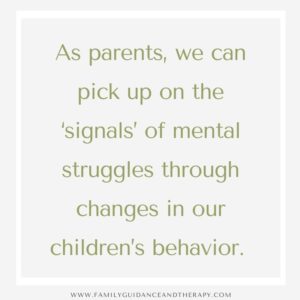Stress is a Part of All Our Lives
Children, like adults, experience stress. Anxiety in our children typically comes from a variety of sources, such as stress over relationships and peers, over packed schedules, or school pressures.
Unfortunately, the common struggles that come with life have been coupled with new experiences this past year, and the stress of everything is getting to our kids. The anxiety level in our children is the highest it has ever been.
Stress and Anxiety in Pre-teen Children
Stress is a part of all our lives. Our children are not excluded.
Too much stress, external stress that is severe, frequent, or constant, can lead to mental and physical exhaustion, overwhelm, depression, and anxiety in our kids.
Young children typically do not know when they are stressed. As parents, we can pick up on the ‘signals’ of mental struggles through changes in our children’s behavior.
Anxiety in a pre-teen child can present as physical and behavioral signs that may look normal, but the symptoms can be more pronounced and sudden in the face of stress, such as anger, fear or fearlessness, poor grades or difficulty completing assignments, pulling away from activities that used to give them pleasure, argumentative, clinging to a parent or one person, crying, sleeping too much or too little, sudden loss or increase in appetite, slowed down growth rate, stomach aches, headaches, or general ‘feeling bad,’ and talking about hurting themselves.
Stressed young children may also regress to past behaviors, such as thumb sucking, bed-wetting, or wanting to be held like a baby. This can also be an indication that your child has experienced trauma.
Here are 10 Tips for Helping Your Child Manage Stress
1. Ensure your child feels safe.
Your priority is to ensure that your child has a calm, safe, and secure place to come home to.
Tell your child that despite what might be going on in the world, your home is a haven.
Ask your child to share any fears that they may have, but do not force them to give you a response. If your child will not share their fears with you, ask them who they feel comfortable sharing with, and ensure that person is available to your child.
2. Put your household on a media diet.
Keep negative news viewing to a minimum and try to catch up on the news during adult time only. Children do not process stressful news (like COVID and its ramifications) like we do. It is okay, and healthy, for children to understand that the world they live in has changed, but they need to feel safe. A constant stream of disparaging news can be harsh on a youngster’s mental health.
3. Talk to your child.
Communicate in a supportive and empathetic manner.
Ask your child how they are feeling. Choose wording that is closer to what your child may be perceiving. They may not know that they are feeling stressed or depressed, but they may know that they are feeling confused, sad, or scared.
Remember to use patience. Give your child time to express themself. Leave the opportunity open to your child to talk with you when they are ready. This will boost your child’s sense of security, which wards off stress and anxiety.
4. Practice methods of relaxation with your child.
Not only will your child feel less stressed, but the fun in these methods, especially when completed as a family, can help everyone relax and want more of the same!
Develop coping methods in your child by practicing deep breathing methods, exercising, or spending time outdoors. Make a game of it.
Sit outdoors with your child. Have your child close their eyes and name off everything that they hear or feel. They might feel the warmth of sunshine, a breeze, or a drop of rain. They might hear birds chirping, a honk of a horn, or children playing at the park. This gets your child out of the house, into a different setting, and helps them to feel grounded (present and more connected with the world).
5. Avoid overscheduling.
Routine is good for people, but overscheduling can cause unnecessary stress in young children. Ensure there is a time each day for your child to relax and enjoy idle time.
Your schedule as a parent is important too. If you are rushed and too busy to partake in much-needed downtime, your child will involuntarily pick this up as stress.
6. Encourage playtime.
Younger children are particularly good at brushing off the world and going into playtime, but a stressed child may feel less inclined to do so.
When young children freely dip into imagination, it helps their overall development.
Ensure your child partakes in physical exercise, which is critical to their well-being. Consider fun exercise, such as bike riding, playing ball in the backyard, or dancing to music.
7. Make sleep a priority.
Healthy sleep patterns encourage mental and physical well-being.
Ensure your child keeps to a regular daily routine, including sleeping, napping, and waking times.
You can be the role model in this. If you are up late into the night, especially if you are in front of a television, your child may not sleep well either.
Create a healthy and relaxing bedroom space for your child to encourage rest. Discourage screen time during the last hour before your child’s bedtime, and this may mean removing items with screens from your child’s bedroom, especially at night.
8. Teach your child that they do not have to be perfect.
We all make mistakes. Mistakes are part of the learning process in life.
Help your child understand how to do their best, but to realize that they are at their best just by being who they are. When we focus on what matters to us, our values (and help your child understand what matters to them), we are living our ‘best.’
Teach your child that it is okay to be different. It is good to be different and trying to be like someone else (that they may perceive as perfect) is not realistic or healthy.
9. Boost calm in your children by providing toys and activities that deter anxiety and stress.
A container filled with fidget balls, putty spheres, and various puzzles or crafts, may help reduce stress in your child and will create a fun family time when the toys and activities are brought out.
Encourage your child to engage in their favorite crafts, such as coloring or painting. Ask your child to paint or color their feelings (sad, happy, angry, fearful) onto paper to “Let it go!” You can learn much about your child’s mental state through this activity.
Consider purchasing tools, like this deck of cards, which helps to increase mindfulness and relaxation (for all ages), Mindful Kids: 50 Mindfulness Activities for Kindness, Focus and Calm.
Have an awareness of your child’s interests. Your child may want to learn how to play music, or to partake in a hobby, such as cooking. When you help your children partake in their interests, you create a stress outlet for them.
10. Your calmness matters.
When you are stressed, your child becomes stressed. It is catching. If you feel pushed to your limits, while trying to keep up with the pace or the stresses of everyday life, your child will sense and involuntarily absorb the pressure.
Practice a healthy lifestyle and apply tips 1-9 to yourself. Ask yourself, what can I do to feel calm(er) today? What steps can I take to be a strong model of stress management for my child?
You Have This (Helping Your Child Manage Stress)
You can help your child develop coping skills, and you can make changes in your home to relieve some of your child’s stress.
Having an awareness of your child’s anxiety level is crucial. Your young child may not understand the stress that they experience, but you do.
Minor symptoms of stress may go away on their own, but intervention as a functional supportive parent is important in this process. Know that if anxiety develops, it is treatable.
We know you want the very best for your child. You hurt when they hurt. We are here to support your child to learn healthy and practical coping skills that will serve them for their lifetime.
Call 619-600-0683, ext. 1, text us at 619-607-1230 or schedule an appointment online. We have both virtual and face-to-face sessions available for your child. We can also support you in helping your child by refining your parenting approach.

